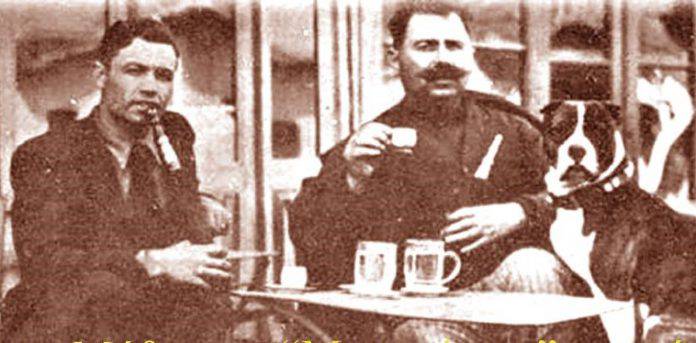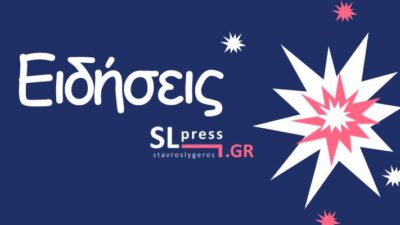Panos Savopoulos: “Α mangas went out for a stroll…”
03/11/2020
I’ve already talked to you about koutsavakides on this site and now it’s time to talk to you about a related class the mangas (dude). The mangas, then, was a popular type of urban dweller, between 1900-1910 until about 1950, who often flirted with the limits of legality and illegality.
Sometimes he overcame these limits, in terms of illegality, but that was not enough to characterize someone as a mangas since there were other elements that completed him. And for this reason, not everyone could be mangas!
The correct mangas (who had little to do with the quaint koutsavakis) was very confident, sometimes even arrogant! He generally had an attractive appearance and was impeccably dressed in a suit, white shirt, vest, handkerchief, and sometimes a tie. He had a mustache, he held an amber rosary, he had a silver ring on his finger, while in his pocket there was always a cutting instrument (the poor were limited to a shoemaker’s knife).
On his feet he wore stivalia, that is, shoes like boots, not as high as the Cretan stivania, but only 10 cms above the ankle. George Batis also wore such stivalia until his death. The mangas had a weakness for women and was not loyal, which is why he sometimes got an earful from the corresponding lady manges-rebetisses of his time. A characteristic song from 1933 is “Trava re alani” (Take a hike bum).
The serious mangas was quirky. He never rode a horse, did not hold an umbrella and became furious if someone in the group rested his foot on the chair he was sitting on! In general, he did not talk much, in fact, there were some “heavy” manges who, out of their gravitas, murmured their words, that is, they did not say them clearly and that is why they called them “mourmourides” (murmurers).
A mangas hated lies
The mangas hated lies, injustice, and wickedness! He protected the weak and worshiped his mother. If anyone insulted her, he would have a rough time at the hands of the mangas. Some tough guys, instead of choosing to deal a couple of slaps at the person disrespecting their mothers, took the cutting instrument out of their pockets and marked the man for life. They even told him “from now on I call you marked” and ‘it stuck! If there were many marked men, then an identifier was needed:
The one marked at Tambouria, the one marked at Drapetsona, etc. Apostolos Chatzichristos wrote the song “I manoula” (The mother, 1937), a very beloved song in its time. It is memorable that the night his mother died, Apostolos was on stage and in fact, due to a painful coincidence for him, they persistently asked him to sing this song. Later he was notified of the incident … Today, my brethren, no songs are written about mothers, because the subject is considered tres banal!
Outside of tobacco and drinks, the mangas necessarily smoked hashish. Some manges went in for harder drugs, but the rightful manges avoided them, because they considered them “rags”. Smoking was done in any safe place, but in case of emergency, even a boat was used to reach some remote rocks (or cave) where coast guard cops did not dare approach. A characteristic “reportage” is the song “Zeybekano spaniolo” (1934), by George Batis, which also mentions the people who participated in the hashish ritual.
Also mentioned is the “Dragon Cave”, which some say was located at the foot of Drapetsona, while others in Keratsini-Perama. I have also heard the following “story” (which has its fun, of course), that is, that the Dragon Cave was one of the caves (opposite Psytallia?) To which the defeated warriors of Xerxes took refuge (Battle of Salamis, 480 BC .Χ.), who was watching the tragic fate of his fleet from Mount Egaleo!
Prisons and tekedes
The cradles of rebetiko songs were the prisons and the tekedes (hash houses, sing.tekes). The tekedes were either open, or secret. Now, how the open tekedes worked is not difficult to understand, because as you know in this country, what is forbidden is often allowed through various loopholes, ie bribes, connections, kinship, sex, and halleluiah!
However, the guys smoked as much hash as they wanted and the law could not do much, since the tekedes were frequented, they used to say, by “rich people, industrialists… and all the enfant gâté (the spoiled kids)” (well connected, obviously) according to the song “Our manges complain” (1935) by Jovan Chaus. There are many rebetikas about tekedes, in which their names are mentioned!
An essential object of the mangas’ appearance was the komboloi/rosary. I have written everything about the komboloi in the book “The roots of rebetika” (ODOS PANOS, 2018). The most famous song for a rosary is the homonymous one by Mitsakis, on the occasion of the loss of his favorite rosary during the Axis Occupation.
The name mangas
Let me tell you about the name “mangas”. Here the quaint classicists have no opinion and so we avoided hearing about ancient manges drinking mandrakes and wearing chitons! Various etymologies have been heard, but most likely the word “mangas” comes from the word “manga”, of Turkish-Albanian origin, which means “a band of about 30 irregular warriors”. During the liberation struggle of 1821, war chiefs formed bands of 30 people and each group was called “manga” and its leader, “mangas”.
It is worth telling you that the members of the “manga” created by the infamous Kolettis when the national assembly in Astros broke in two in 1831, were thugs. (I call him infamous because he is one of those responsible for the current mess of our poor country). Imagine that the purehearted war chiefs, ignored by many but with clean hands, were called by the members of Kolettis’ “manga”, ” moschomanges” (sweet smelling manges). The word has also been used in a rebetiko song, and the relevant verse says: “To me, you are a moschomangas, you are also a troublemaker, you hang out in the tekedes, and you are also a pimp.”
The word “mangas” gave birth to several derivatives, each with a special meaning, which have been passed on to rebetika songs: Archontomangas (princely mangas), pseudomangas, arkoudomangas (bear likemangas, meaning coarse), donkeymangas, dogmangas, gerontomagkas (aged mangas), machalomangas (neighborhood mangas), vlachomangas (bumkin posing as mangas), kouradomangas (turd mangas, meaning pitiful mangas) etc.
As concerns the machalomangas, the homonymous song by Tsitsanis with Bellou from 1949 is known.
The woman mangas
However, nowadays, a man who is successful in his life (but after hard work), is called a “mangas”! Apart from the word mangas and its derivatives, in the slang of manga-ness, there were other words, very nice, very comprehensive and many with some history. And if you are wondering why so many words, I assure you they are needed by manga family. The hypocrites, the righteous ones, those with social complexes, but also the cunning ones, called all manges bums (a very bad word among manges) and that was that. The manges, however, wanted accurate descriptions of their kind. So words of manga somewhat synonymous with the word manga, are:
Seretis, alanis, asikis, mortis, dervishes, bully, vlamis, derbenderis, mOurmOuris etc. The woman of the manga environment was called Mangissa and Mangitissa, and the very young mangas was called Mangitis. The mangas woman was not just any woman. She was highly respected by the mangas and his physical strength was never used as a weapon! For the maggises, let’s say rebetisses, of the 1920s and ’30s, I will talk to you in a special article and I assure you that you will be satisfied, especially as to their way of life. For the topic “manges and prison” I have already presented a text here on slpress.
The very common phrase “From a young age it seemed” exists in a song by Michalis Genitsaris from 1937. The first verse says:
“A mangas I seemed to be from a young age, I understood the smarts and I learned to play bouzouki”.
Something unique in the rebetika discography, is the song “O xemangas” (the former mangas), composed by Vangelis Papazoglou from 1930. Xemangas is the former dude, a rare thing in the world of manga-ness! The first verse says: “I’m tired of the hookah, I’m tired of hash, I’ll let my body find troubles elsewhere.” The last verse, however, tells many truths, since the creator of the song knew the world of the manges very well: “Because as long as I was smoking and playing the dice, I was called smart to my face and behind my back I was called a crazy man”.
The language of the mangas was modern Greek, but sometimes they used words or phrases from the katharevousa, the more archaic form. They did this either to strike a pose or for fun. The important thing is that the slang of the manges contains many passwords that the guys used every day. I’m sorry that the universities have not dealt with the language of the manges and its recording, but the good people on the internet have taken care to present almost everything that has been published about it.
It is impossible to determine how many special words the mangas used in everyday life, which of course the others did not understand. Elias Petropoulos in his pioneering book “REBETICA SONGS” (1968), presents 550 words. In 1950, Brasidas Kapetanakis published the dictionary of the square with 820 words. From some little knowledge I have of “guild glossaries”, my opinion is that the necessary everyday words of the manges may not have been even 100!
And where can I write to you about the way the mangas spoke, that is, about the sounds, the gestures, the grimaces, let’s say simply the prosody! The characteristic dialogue between V. Papazoglou and S. Perpiniadis at the beginning of the song “The voice of the hookah” is unique in the discography of 78 turns.











